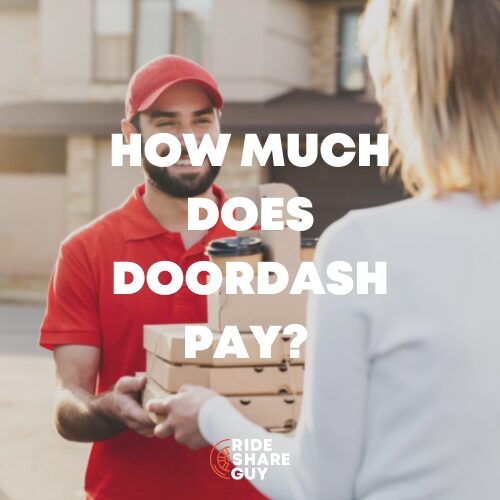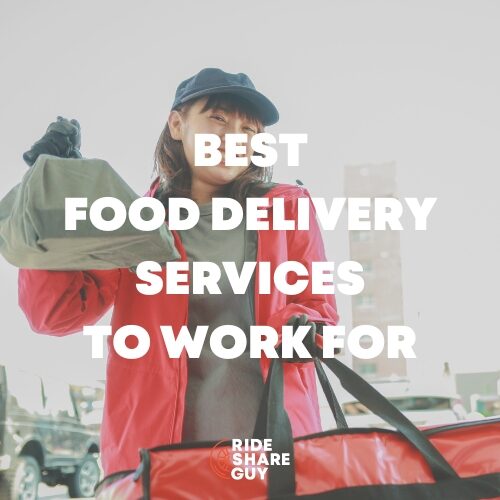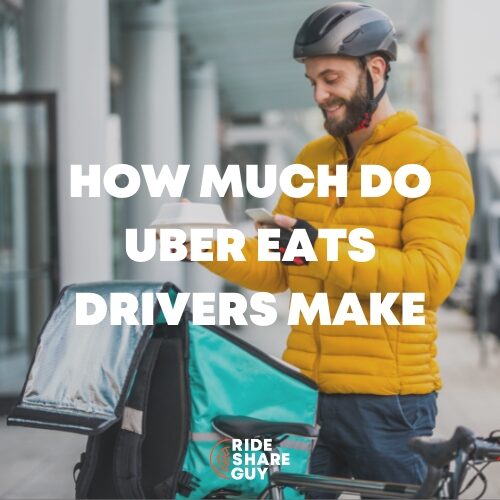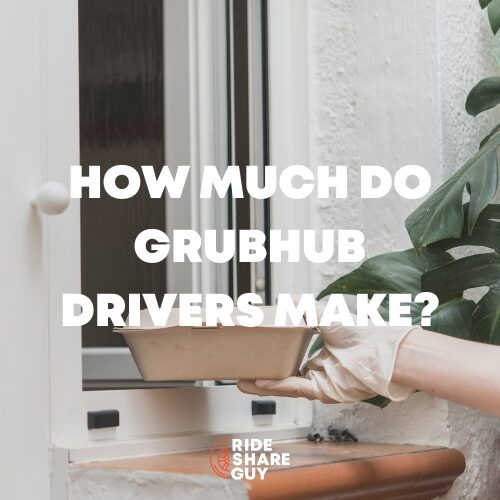Uber Eats is a convenient way for gig workers to pick up work when they have free time in their schedule. Earn extra cash just for dropping off food.
But in order to drive for this food delivery service, you do need to have auto insurance coverage — in your name — on the vehicle you’ll be driving to make drop-offs.
Uber Eats will offer drivers some insurance coverage while they’re on the job — picking up or dropping off a food order — but you also need to have your own liability insurance too. When you sign up to deliver for Uber Eats, you will need to submit proof that you have coverage.
Your personal car insurance will not cover you for any business use. This includes driving for rideshare services or food delivery gig work.
As such, you’ll need to add extra rideshare insurance to your current policy. This article will cover what exactly Uber Eats insurance requirements are, including how to find the best insurance quotes so you can be Uber compliant and save a buck or two while you’re at it.
What Car Insurance is Required for Uber Eats Drivers?
To make car deliveries for Uber Eats, you’ll need to have personal car insurance that meets the minimum coverage requirements in your state.
Beyond that, you will need to add rideshare insurance coverage. The state of New York has additional, more stringent requirements for rideshare operators and delivery drivers.
Uber Eats will request that you submit proof of personal vehicle insurance when you sign up – as will any other app delivery company – but they will not verify whether or not you have added any business-use coverage. (They might not even follow up with your policy carrier to ensure that it’s valid.)
Does a Personal Car Insurance Policy Cover Food Delivery Drivers?
No, a personal car insurance policy will not cover food delivery drivers — unless you specifically request this coverage when you sign up with your insurance policy.
If you get in a car accident while driving for Uber Eats — or Postmates or DoorDash or any other similar app — and do not have rideshare coverage, you will be in hot water. Your personal insurance company policy will not pay out and you may face further legal difficulties as well.
Rates for rideshare are quite affordable – they can range from $6 to $30 per month – so there’s no good reason to not comply. You can easily compare rates online across different auto insurance companies. Gig work has become so mainstream that virtually all insurance companies offer special policy extras to cover rideshare driving.
Rates will vary based on your coverage limits, driving record, area where you live, age, and how much driving you’ll do for Uber Eats.
You may find you can switch to a different insurance provider — for personal and rideshare coverage — and save several hundred dollars.
Commercial auto insurance is another option that can cover you for Uber Eats and other rideshare companies. A commercial insurance policy will cost significantly more (several thousand dollars a year) and is meant to cover a vehicle specifically being used for business purposes only.
Does Uber Eats Provide any Insurance?
Yes, Uber Eats does. And the insurance coverage is actually pretty good.
However, that coverage is meant to supplement your existing coverage and only protects you when you’re logged in as a driver and making deliveries.
It will not cover you when running personal errands, driving to the gas station, or picking up your kids at school. Also, it does not cover accidents that occur in New York state.
Cynically speaking, the coverage is meant to protect Uber Eats from lawsuits and limit their risk.
What Uber Eats Supplemental Insurance Covers
All the same, let’s go over what Uber Eats’ supplemental insurance covers for you as a driver.
When You’re Available or Waiting for a Delivery Request
Uber maintains third-party liability if your personal auto insurance doesn’t apply (won’t pay):
- $50,000 in bodily injury per person
- $100,000 in bodily injury per accident
- $25,000 in property damage per accident
When You’re En Route to Pick Up Deliveries or During Trips
- $1,000,000 third-party liability
- Contingent comprehensive and collision coverage — up to the actual cash value of your car with a $2,500 deductible
That $2,500 deductible must come out of pocket. Even if you have supplemental gap insurance, gap insurance does cover any deductible payments.
Should I Buy Extra Insurance When Driving for Uber Eats?
Possibly yes. If you’re going to be regularly driving for Uber Eats, supplemental coverage is prudent. As we’ve discussed at length, Uber Eats requires you to carry your own insurance.
Beyond the minimum liability coverage for rideshare that you’ll need on your policy, you may want to consider more full coverage options. This will give you increased protection and peace of mind.
Full-Coverage Insurance is a Good Idea for Most Uber Eats Drivers
This type of motorist coverage can protect your vehicle in the event that repairs are needed, regardless of who is at fault in the accident.
So if you accidentally rear-ended another vehicle, this type of policy would cover the repairs for your car and for the other party.
Every policy is different but full-coverage options commonly include:
- Collision coverage: damages caused by collision with a moving or stationary vehicle
- Comprehensive coverage: broader coverage if your vehicle is damaged for other reasons, like weather, vandalism, or a force of nature (i.e. hitting a deer).
If you have full coverage on your vehicle, Uber Eats will up its own coverage even further — up to the cost of your vehicle’s cash value.
The average cost for full-coverage insurance in the U.S. is $1,732 but rates start as low as $1,054 for some providers.
Your insurance cost will vary based on the provider (i.e., Allstate or Progressive), your driving record, your location, coverage levels (i.e. deductible amount), and the make and model of your vehicle. You can talk to an insurance agent for an exact quote, or get a free estimate online.
But a $1,054 annual price tag breaks down to about $87 a month which is generally affordable.
Uber Eats Supplemental Personal Injury Protection (PIP)
You may also consider enrolling in Uber’s optional, supplemental PIP—added insurance to cover medical expenses, disability benefits up to $500 per week, or survivor benefits.
This added coverage costs $0.024 per mile (of driving), or $2.40 for every 100 miles.
You can sign up online and you can un-enroll at any time. You’re not locked into the optional PIP for a set period of time and any Uber Eats driver is eligible.
If you worked full-time doing Uber Eats, and drove 2,000 to 4,000 miles per month, you would be paying $48 to $96 per month. Rates for a private disability insurance plan would likely be similar — and often come with medical requirements including a physical exam.
Frequently Asked Questions
Here are some of the most commonly asked questions about Uber Eats insurance requirements.
Do you need to provide proof of insurance for Uber Eats?
Yes, when you register to become an Uber Eats driver you must provide proof of insurance along with copies of your car registration and driver’s license.
Can you use your parents’ car for Uber Eats?
In some circumstances, yes. You can drive a car that you don’t own if you are listed as an insured driver on the insurance policy. Uber will not approve you if your name is not included on the insurance documents.
Will working for Uber Eats increase my car insurance coverage rates?
Probably yes. But monthly rates to add rideshare coverage to an existing policy range from $6 to $30.
Amid policy shopping, if you were to switch providers (i.e., Geico is around half the cost of Allstate), you could increase your car insurance coverage and save money at the same time.
Bottom Line
In order to drive for Uber Eats, you need a personal auto insurance policy in your name – or someone else’s name with you listed as a covered driver – that meets minimum state liability requirements.
Beyond that, insurance companies will require additional coverage if you use your vehicle for deliveries or rideshare work and Uber also offers optional personal protection coverage that may be a good option for you and any dependents.
If you have coverage now, check out how your insurance rates compare to national averages to see how much you’re saving — or overpaying. And if you don’t have coverage yet, find out how much it would cost to add rideshare to your existing policy.




